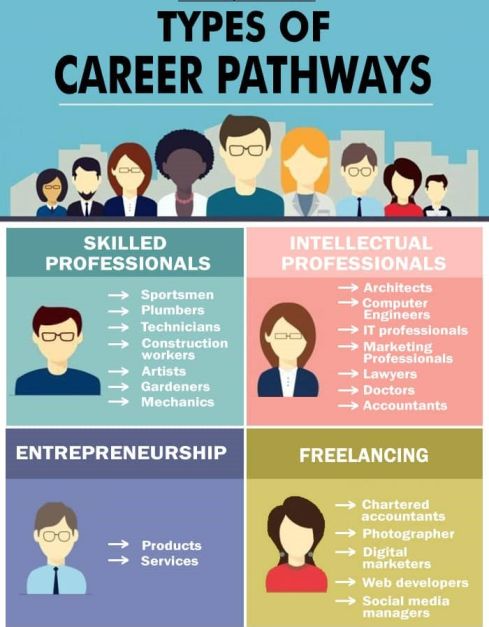Ever thought about what is a career pathway? It’s the journey or part of your life that focuses on work and earning a living, a process of learning, growing, and gaining experience through employment. Let’s learn more about it.
What Is A Career?
A career is a person’s journey through work life, where they set goals, gain experience, and grow professionally over time. For many adults, work takes up about one-third of the day. A career is what you do to earn a living, which may require education, skills, and a willingness to learn. It also reflects the progress and effort someone has put in over the years, including the jobs they’ve had and the positions they’ve achieved.
A 1998 study 1 Judge, T. A., Locke, E. A., Durham, C. C., & Kluger, A. N. (1998). Dispositional effects on job and life satisfaction: the role of core evaluations. The Journal of applied psychology, 83(1), 17–34. https://doi.org/10.1037/0021-9010.83.1.17 pointed out that the influence of work is pervasive in many domains of life and poses important life consequences for one’s life satisfaction, health, and subjective career success. However, another 2014 study 2 Lasi, H., Fettke, P., Kemper, HG. et al. Industry 4.0. Bus Inf Syst Eng 6, 239–242 (2014). https://doi.org/10.1007/s12599-014-0334-4 revealed that current market labor trends such as increased automation and robotization of work may have a considerable impact on the sustainability of people’s careers.
Research 3 Thijssen, J. G. L., Van der Heijden, B. I. J. M., & Rocco, T. S. (2008). Toward the Employability—Link Model: Current Employment Transition to Future Employment Perspectives. Human Resource Development Review, 7(2), 165–183. https://doi.org/10.1177/1534484308314955 also showed that happiness, health, and productivity are considered the three indicators of a sustainable career.
Health constitutes both physical and mental health and refers to the dynamic fit of the career with one’s physical and mental health. Happiness refers to one’s values, career goals, and needs. While productivity means strong performance in one’s current job and guaranteeing high employability 4 Heijde, C. M., & Van Der Heijden, B. I. (2006). A competence-based and multidimensional operationalization and measurement of employability. Human Resource Management, 45(3), 449-476. https://doi.org/10.1002/hrm.20119 or career potential towards the future.
Types Of Career Pathways

Career pathways can be defined as a series of jobs that determine your career success and pave the way to achieve your long term career goals. It is essential to understand that there is no set-out blueprint for achieving career success. The journey differs from person to person. There are typically four career pathways. They are as follows:
1. Skilled Professionals
Skilled professionals are people who exercise their learned skills in achieving a task. These are physical skills and are offered as a service. These jobs are often paid on the basis of hours worked. Some of these jobs can include:
- Athletes and sportsmen
- Plumbers
- Technicians
- Construction workers
- Artists
- Gardeners
- Mechanics
2. Intellectual Professionals
Intellectual professionals are people who have acquired some knowledge about a particular career field. These fields can include medicine, law, accounts, engineering, and others. Intellectual professionals offer their intellect and knowledge to achieve their career goals. Some of these jobs include:
- Architects
- Computer Engineers
- IT professionals
- Marketing Professionals
- Lawyers
- Doctors
- Accountants
Intellect and skills may also be interrelated. Several jobs may require both intellect as well as skills. For instance, a salesman’s job requires both physical and intellectual labor.
3. Entrepreneurship
This career path involves starting and running your own business. A business is something that provides value or solves a problem for customers. If someone wants to become an entrepreneur, they need a mix of skills to succeed. They must raise money, create a product or service, and set up the business.
4. Freelancing
This type of career pathway involves selling a service or skill. In this option, you sell a set of skills as an independent contractor. Some of these jobs include:
- Chartered accountants
- Photographer
- Digital marketers
- Web developers
- Social media managers
Career Management
Career management means actively and effectively handling your career growth. It plays a key role in helping you reach your career goals. Good career management includes feeling fulfilled, having a healthy work-life balance, being financially secure, and reaching your life goals. It can be broken down into four main steps:
Step 1: Developing Overall Goals
The first step is to assess and develop your overall goals and objectives. Ask yourself what are your short and long-term goals? Career assessments can also help to identify what you are excellent at and what needs improvement. Evaluate your skills and knowledge to develop and strategize your goals.
Short-term goals constitute the immediate plans you may have in one or two years and have a very limited scope. These are easier to devise and are achievable goals. Whereas, long-term goals constitute the plans you may have in twenty years’ time and have a broader scope. It can be easily modified according to the opportunities that come during the course of your career. Step one also involves personal development and improving skills and knowledge throughout the span.
Read More About Life Skills Here
Step 2: Career planning
This involves planning what fields to pursue that are suited to your educational and professional qualifications. This is an ongoing process that needs to be supervised and assessed continuously throughout your work life span. It is of utmost importance to devise a career plan to visualize your future and where you see yourself in 20 years. It also helps you to do a SWOT (Strengths, Weaknesses, Opportunities, and Threats) analysis by assessing your strengths and weaknesses over time. The process of career planning can involve:
a. Self-awareness – Understanding yourself and your life goals is essential. Evaluate your interests, skills, values, talents, and abilities to devise a plan that works with you.
b. Self-development– This involves improving your existing skills and talents to excel at your tasks. Assess how you can utilize your strengths, motivation, talents, and experiences efficiently to reach your long-term goals. Evaluate your scope of career development and work towards an action plan.
c. Execution– Once you are aware of your goals and have started working on improving your skills, you can devise an action plan to execute it effectively. Keep a track of your activities to ensure that you are working according to your plan of action.
It is seen that the majority 5 Unanue, W., Gómez, M. E., Cortez, D., Oyanedel, J. C., & Mendiburo-Seguel, A. (2017). Revisiting the Link between Job Satisfaction and Life Satisfaction: The Role of Basic Psychological Needs. Frontiers in psychology, 8, 680. https://doi.org/10.3389/fpsyg.2017.00680 of people are not sure what they want out of their career and life.
A major portion of life is spent on achieving short-term and intermediate goals. Hence, it is essential to assess your skills in order to plan your career to your advantage. This can help you to understand the true purpose of your life.
Career Success
The definition of success differs from one person to another. Career success is a term often used to describe academic or occupational advancement. Being successful and accomplished are two different concepts. Accomplished people earn competitive credentials, get high profile jobs, or earn extensively high salaries.
A 2020 study 6 Xin, L., Zhou, W., Li, M., & Tang, F. (2020). Career Success Criteria Clarity as a Predictor of Employment Outcomes. Frontiers in psychology, 11, 540. https://doi.org/10.3389/fpsyg.2020.00540 pointed out that most people developed linear careers with relatively aligned interests and targets such as pay raise and promotions which were considered as objective career success.
However, career success can be defined as a state that involves a combination of achieving financial stability, maintaining a work-life balance, and enjoying the work that satisfies your personal fulfillment. People who are successful understand the importance of balancing health, happiness, and productivity. Peace and happiness in your choice of career is also an essential element to attain career success.
A 2006 study 7 Hoyle, R. H., & Sherrill, M. R. (2006). Future orientation in the self-system: possible selves, self-regulation, and behavior. Journal of personality, 74(6), 1673–1696. https://doi.org/10.1111/j.1467-6494.2006.00424.x pointed out that career success criteria are based on a combination of dynamic self-esteem, self-schemas, belief, values, and goals, information processing, and vocational behaviors.
The majority of people do not attain this state because they refuse to take career risks, feel powerless to change their current situation, or wait for the right opportunity. A 2016 study 8 Robinson, G. F., Schwartz, L. S., DiMeglio, L. A., Ahluwalia, J. S., & Gabrilove, J. L. (2016). Understanding Career Success and Its Contributing Factors for Clinical and Translational Investigators.
Academic medicine : journal of the Association of American Medical Colleges, 91(4), 570–582. https://doi.org/10.1097/ACM.0000000000000979 claimed that awareness of the factors that facilitate or hinder career success is crucial in achieving your goals. Another report 9 Vansteenkiste, M., Ryan, R.M. & Soenens, B. Basic psychological need theory: Advancements, critical themes, and future directions. Motiv Emot 44, 1–31 (2020). https://doi.org/10.1007/s11031-019-09818-1 also found that early career success can create disappointment in later life, especially when an individual’s self-worth is directly related to their achievements or advancements.
Success isn’t about making a lot of money while being unhappy. Balancing the two states is the true definition of success. Successful people possess the emotional and mental stability to make decisions that work in their favor.
Personality And Career Success
Personality and career success are closely related. A 2002 study 10 Judge, T. A., Heller, D., & Mount, M. K. (2002). Five-factor model of personality and job satisfaction: a meta-analysis. The Journal of applied psychology, 87(3), 530–541. https://doi.org/10.1037/0021-9010.87.3.530 claimed that personality has been associated with a number of objective and subjective occupational outcomes such as job performance and satisfaction. Another 2003 study 11 Roberts, B. W., Caspi, A., & Moffitt, T. E. (2003). Work experiences and personality development in young adulthood.
Journal of personality and social psychology, 84(3), 582–593. pointed out that extrinsic and intrinsic aspects of career success have been implicated in personality changes. A 2009 study 12 Sutin, A. R., Costa, P. T., Jr, Miech, R., & Eaton, W. W. (2009). Personality and Career Success: Concurrent and Longitudinal Relations. European journal of personality, 23(2), 71–84. https://doi.org/10.1002/per.704 attempted to understand the influence of personality traits on career success. The big five personality traits, namely, openness to experience, extraversion, neuroticism, conscientiousness, and agreeableness were assessed to understand which personality trait influences career success.
This study identified two main types of success: extrinsic and intrinsic. Extrinsic success is based on visible, measurable outcomes like getting a raise or a promotion. Intrinsic success, on the other hand, is about how a person feels about their job, such as how satisfied they are. Research has consistently shown that extrinsic success is often connected to personality traits like neuroticism.
A 2005 study 13 Nyhus, E. K., & Pons, E. (2005). The effects of personality on earnings. Journal of Economic Psychology, 26(3), 363-384. https://doi.org/10.1016/j.joep.2004.07.001 found that people who score high in neuroticism often earn less money or hold lower-level management jobs. In contrast, extroverts tend to earn more, get promoted more often, and reach higher positions in management.
Openness has shown mixed results, being linked to both higher and lower financial success. Those who are agreeable usually earn less and have lower career success. Meanwhile, conscientious individuals tend to do well in terms of salary, promotions, and overall career success.
Hence, career success and personality development continue to be associated throughout adulthood. For instance, men with a self-directed personal orientation earn higher salaries over a ten-year span. Personality remains stable but changes may occur because of natural age-related changes in brain maturation and changes in genes across the lifespan. A 2006 study 14 Kahneman, D., Krueger, A. B., Schkade, D., Schwarz, N., & Stone, A. A. (2006).
Would you be happier if you were richer? A focusing illusion. Science (New York, N.Y.), 312(5782), 1908–1910. https://doi.org/10.1126/science.1129688 found that money can’t buy happiness or well-being but can play a major role in decreasing dispositional proneness to negative effects and emotional distress. People who earn more are more likely to be less angry, frustrated, or bitter. Financial independence also reduces depression and anxiety.
Personality may shape one’s daily experiences on the job but not its rewards. With time personality can influence the individuals’ working environment such as their latitude to make decisions, opportunities to utilize their skills, and their physical working conditions. To conclude, personality and career success have been hypothesized to mutually influence an individual’s life throughout their life span.
Choosing A Fulfilling Career
A career is a long-term process that is characterized by constant learning, gaining experience, networking, and seeking opportunities. Although education is required to advance our career, experience may have a major impact on the overall success of the individual. A fulfilling career is not about what you choose to do but more about how you achieve your goals.
Career At A Glance
- Career pathways are the steps or jobs you take that lead to long-term career goals.
- Career management means making choices that lead to personal satisfaction, balance, financial stability, and life achievements.
- Career success is about doing well in school or at work.
- Personality has a strong connection to how successful you are in your career.
- As people grow, career success and personality continue to influence each other.
Frequently Asked Questions (FAQs)
What is a career pathway?
Career pathways are the steps or jobs you take that lead to long-term career goals.
How to choose a career?
Education is required to advance our career, experience may have a major impact on the overall success of the individual.














